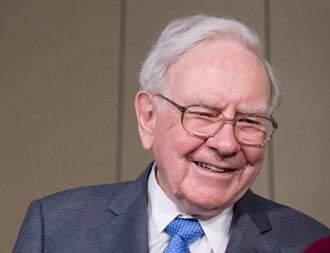Over the weekend, Warren Buffett hosted the annual Berkshire Hathaway Inc. (NYSE: BRK.A) shareholder meeting.
The so-called “Woodstock for Capitalists” featured a few surprise revelations from the Oracle of Omaha.
Buffett, who has been at the helm of the company since 1970, expressed optimism over the long-term outlook of the U.S. economy.
“Nothing can basically stop America,” Buffett quipped.
He would also go onto say that “you can bet on America.”
But if you dig through the transcript or listen closely to the full video of the event, you can’t help but notice that Buffett was less optimistic about the near-term conditions and more realistic about the challenges that we face in the months and years ahead.
Here are the three most important takeaways of the 2020 Berkshire Hathaway Annual Shareholder Meeting.
Warren Buffett Takeaway No. 3: Airlines Provide No Value to Buffett
Warren Buffett famously reversed his stance on airline companies in 2016 after years of avoiding the industry. On Sunday, he stunned the markets by announcing that his company didn’t just sell a small stake in its airline positions after just four years of investing.
 Buffett’s firm unloaded the entire positions in American Airlines Group Inc. (NASDAQ: AAL), Delta Air Lines Inc. (NYSE: DAL), Southwest Airlines Co. (NYSE: LUV), and United Airlines Holdings Inc. (NYSE: UAL). The news set the U.S. Global Jets ETF down 6.2% on Monday.
Buffett’s firm unloaded the entire positions in American Airlines Group Inc. (NASDAQ: AAL), Delta Air Lines Inc. (NYSE: DAL), Southwest Airlines Co. (NYSE: LUV), and United Airlines Holdings Inc. (NYSE: UAL). The news set the U.S. Global Jets ETF down 6.2% on Monday.
This is a very important decision. Remember, Buffett is a long-time value investor who is always seeking a chance to buy stocks for fractions of what he perceives they’ll be worth in the future. On a scale of value from 1 to 10, Buffett effectively ranked airline stocks at ZERO.
He isn’t willing to take a chance on the airline industry in the post-COVID world. During the meeting, he questioned whether passengers will fly as much as they once did.
“The world has changed for the airlines,” he said. “I don’t know if Americans have now changed their habits or will change their habits because of the extended period.”
More Americans may take vacations that are closer to home, and companies may turn to teleconferencing as a way to meet or engage in sales pitches – thus threatening the era of business travel.
Warren Buffett Takeaway No. 2: Federal Reserve Upended Berkshire’s Model
Some of Berkshire Hathaway’s greatest deals came in the wake of a financial crisis.
Back in 2008, the company received extremely favorable terms from two major U.S. firms.
He helped save Goldman Sachs in the deal of a lifetime. For $5 billion in September 2008, Buffett secured preferred shares that paid a 10% yield. Plus, he had warrants that allowed him to purchase another $5 billion in GS stock at $115 per share.
Meanwhile, for another $3 billion, he received a 10% dividend on preferred shares of General Electric Co. (NYSE: GE). GE ended up repaying all of that money plus a 10% premium for the preferred stock.
On these 2008 deals, Buffett said: “They seemed intelligent things to do and markets were such that we didn’t really have much competition.”
But the recent efforts from the U.S. Federal Reserve and Congress gave the market little time to engage in true price discovery. The Fed’s decisive action to provide unprecedented liquidity prevented Buffett and team from finding value or companies desperate for his firm’s support.
“There was a period right before the Fed acted, we were starting to get calls,” Buffett said. “They weren’t attractive calls, but we were getting calls. And the companies we were getting calls from, after the Fed acted, a number of them were able to get money in the public market frankly at terms we wouldn’t have given.”
Buffett said that nothing remained attractive to him, and the Fed undercut any opportunities.
Instead, Berkshire began hoarding cash, which brings us to Buffett’s biggest takeaway…
Warren Buffett Takeaway No. 1: Buffett’s Worst-Case Scenario
Buffett warned that the U.S. Federal Reserve is beyond the uncharted waters, and now moving into territory so foreign that it is impossible to forecast.
The Fed is pumping trillions into the market, and the U.S. Treasury Department is looking to borrow at least $3 trillion this quarter alone.
“We’re doing things that we really don’t know the ultimate outcome to,” he said. “I think in general they’re the right thing, but I don’t think they’re without consequences, and I think they could be of extreme consequences if pushed far enough. But there would be kind of extreme consequences if we didn’t do it as well.”
Even though Buffett’s firm now has $137 billion in cash and Treasury bills on its balance sheet, Buffett said that this position “isn’t all that huge when you think about worst-case possibilities.”
Berkshire actually raised money for the quarter – and suggested it can act to help its investments through a mild downturn. But he seemed to imply that not even a financial mind as brilliant as his can offer any true outlook on the impact of the Fed or COVID-19. We didn’t hear Buffett echo his past messages of encouraging people to be greedy and jump into the market while so much fear dominates the world economy.
Instead, he cited the bearish stretch between 1929 and 1951, a period that took decades for the Dow Jones to rebound from its peak following the crash, the Great Depression, and World War II.
Buffett wasn’t pessimistic, but he certainly wasn’t optimistic.
He was simply being realistic – and that was worth the price of admission.
— Garrett Baldwin
Source: Money Morning


